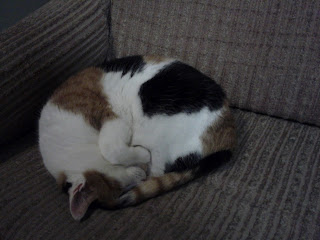Why are they sneezing?
 |
| "Ah Choo! " |
And the answer to all of these are... Coughing sneezing, discharging body parts are just a sign of irritated tissue.
And irritated tissue can be irritated from lots of different things... so it is again, what we call a "non specific sign".
This Astonishing Secret series is all about how you can help your pet before you are able to get in to se us, or me, Dr Liz, the vet at Russell Vale Animal Clinic. Or, you may have your own favourite vet in your little corner of the world.... which is awesome, as I believe that every pet deserves a great vet!
What Astonishing Secret series is not, is a way for you to avoid your vet visit.... if your pet has a problem, they need a vet check.
 |
| Woof-cough-cough--- sharing the love! |
The first thing you need to do is...
- Make sure your backyard is escape proof, the gates are locked,
- Remove your pet's collar - or anything around their neck that could irritate them.
- If you must go walking (not my recommendation in a coughing pet), you need to use a chest harness instead.
- And then keep your pet quiet.
The more your pet runs around, the more air flow through the nasal passages and throat, and the more your pet is going to cough, or sneeze, or struggle to breath.
- Don't give milk, honey or yoghurt... or anything else to "coat the throat"
- Don't allow your pet to run around like an idiot, and
- Definitely Don't allow your pet to mix with other pets until the cause of the problem has been identified.
Oh, a quick word of advice.... don't just turn up at your vet without a prior warning.... if you were a healthy pet in the waiting room, would you want to be exposed to a coughing one? No, you wouldn't, so a bit of consideration goes a long way. We have a protocol in place at Russell Vale Animal Clinic, which allows your pet to wait comfortably, seperated from other ones until we know it is not infectious.
Well, it depends on which part of the respiratory system is causing the most grief for your pet.
Let's start at the nose end - the mucky discharge
You need to see a vet urgently if
- there is bleeding, even if it is a little spot
- the bleeding is like a "punched in the nose type nose bleed"
- there is rubbing of the nose with a paw or along the ground (or any other sign of irritation)
- your pet is making funny snorting noises and appears distressed as a result of it all.
You can
- for a straight nose bleed, you can get a small wad of cotton wool, or toilet paper, or if your pet is big enough, a tampon, and place it in the nostril (make sure you do not go to far) to allow a clot to form.
- For mucoid discharge... one nostril at a time.... get some cotton wool, soften it with some warm boiled water... and then gently apply to the nose for about 30 seconds to soften the muck. A dab of eucalyptus oil on the nose can help with clearing the nostrils (the tiniest amount as it is potent stuff and dogs can smell 1 part in 30 000).
The type of discharge can help us sort out what the cause is.... now the rule is not fixed in stone but....
- if it is watery, then most likely to be allergic or viral.
- if it is mucoid, then most likely to be irritant
- if it is purulent then most likely to be fungal or cancer
- And the caveat is.... if it is due to good old fashioned dental disease, then it is bacterial and your pet needs intraoral dental radiographs to sort out the problem.
Sneezing and reverse sneezing are interesting, and are not the same thing. Sneezing is the forceful expulsion of air out, whereas reverse sneezing is air being sucked in.
Reverse sneezing is commonly seen in brachycephalic dogs (your pugs, shih tzu's), and occurs as a result of a post nasal drip irritating the back of the throat, combined with the overlong tongue and soft palate, causing an irritation. Dogs can have multiple episodes, and it can be distressing to watch.
What can vets do ?
It isn't all antibiotics and anti cough medications. What we do is actually do the "lay of hands" on your pet, to find out where the problem actually is, and then discuss with you what tests need to be done to find out what the problem is.
When we know the where and what, then we know the why it is, and how to treat!
Now for the coughs and splutters.....
This is alot harder to give advice on, as the cough could be due to
- any irritation of the trachea (windpipe)
- any irritation to the lungs - whether it is outside the lungs, inside the tissue of the lungs, inside the airways
- any irritation to the heart
- even good old fashioned heartburn will cause a cough too...
So, any dog with a cough needs a vet check to get it sorted. But what can you do at home to help them till they get to see the vet?
An urgent vet visit is needed if...
- your pet is turning blue - this could be choke, or could be a heart problem - blue is bad, pink is good!
- your pet is breathing rapidly when it is at rest - more than 30 breaths per minute warrants a vet check sooner rather than later
- coughing at a night time or restless breathing - this could be an early marker for heart failure so the sooner the better
- if the cough appears to be productive - that is, the pet is gagging up alot of phlegm with it.
- and definitely if the cough is associated with a nasal discharge - often seen in dogs with pneumonia, and you know how bad that is.
What can you do at home to make them more comfortable?
That is why having a good relationship with your vet is important, as they can help you with advice on what over counter medications you can use until you can get them in. Please do not administer any human cough medications without a vet say-so first.
- Keep them quiet, away from draughts
- Keep them away from other dogs or cats if possible
- Gentle percussion of the chest with cuffed hands may help relieve any phlegm
- Humidify the air - you can use a drop of eucalyptus oil in a bucket of hot water in a laundrey or bathroom or if you have access to one, you can use a nebulizer with saline.
What can vets do?
After a full check up, we will advise you on what sort of procedures and tests are needed to identify what the problem truly is. It is only with knowing what the problem is, and treating that properly, that everyone is going to be happy with the outcome.
In some pets, it is just some antibiotics and rest, and in others, especially if asthma is expected, or Heartworm disease, then antibiotics will do nothing.
But common things do occur commonly....
The common causes of coughing that we see in our area include...
For Dogs:
- Congestive Heart Failure
- Pulmonary nodules (primary or secondary cancer)
- Kennel cough (viral cough)
- Roundworm (the larvae cause damage as they migrate through the tissue)
- Obstructive Airway Disease
- Tracheal Collapse
For Cats:
- Lungworm
- Feline Infectious Peritonitis (FIP)
- Bronchial Asthma
- Toxoplasmosis
Please let me know if this information is helpful. We just love animals at Russell Vale Animal Clinic, and we just want to help them as much as we can.


















